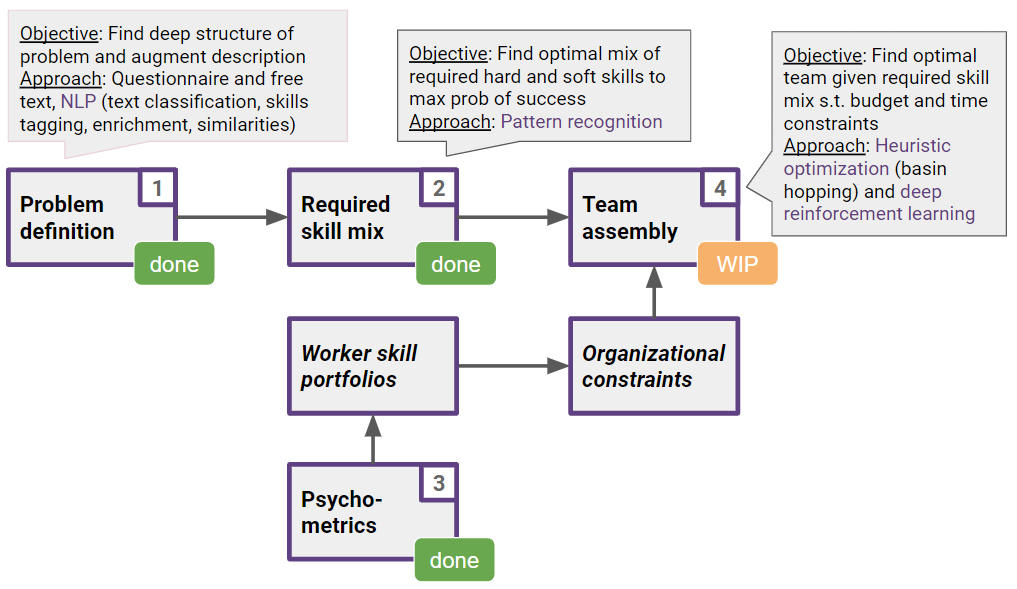Hey, and welcome to the sixth update of the Brave New Teams newsletter.

What happened?
During the last couple of months, we focused on the following:
Thanks for reading Brave New Teams! Subscribe for free to receive new posts and support my work.
- Optimizing the user flow of the MVP and creating wireframes for the web application
- Tuning the deep reinforcement learning model for the team assembly
- Applying psychometrics to personality assessments
Three of the four core model ingredients of SuperScript are finalized; 1) the problem definition, 2) the required skill mix, and 3) the psychometric assessment. In addition, an algorithm for the team assembly mechanism has been implemented. Still, it is slow, and now we are working on an optimization based on deep reinforcement learning to replace it.

User flow for MVP: We worked with Cinnamon, a specialist agency for user design and software development, on the user flow, the core product features, and the sitemap of the application, as well as on wireframes.
Deep reinforcement learning: We continue to improve the deep reinforcement learning method, using hyperparameter tuning to achieve results close to the optimal baseline.
Psychometrics: We worked with Alyssa Birnbaum, an organizational psychologist, to develop a tailor-made survey to help us understand personal tendencies relevant to teamwork. The answers will be used to create optimal teams considering not just hard but also soft skills.
The survey contains 40 questions and takes about 5 minutes to complete. The surveyed categories are 1) adaptability, 2) resistance, 3) curiosity, 4) cooperation, and 5) achievement striving.
- Adaptability: Tendency to be flexible and ready to actively change or adjust in new, changing, or ambiguous work environments.
- Resilience: The ability to bounce back and cope with adversity, risk, uncertainty, conflict, change, or increased responsibility.
- Curiosity: Self-initiative behavior related to seeking information and experiences for their own sake.
- Cooperation: Willingness (and preference) to work with others to complete interdependent tasks, even when not required.
- Achievement Striving: Holding high standards, aiming to achieve excellence.
Why is it important?
Brilliant individuals are not enough to succeed. Equally important though frequently underestimated, is achieving the right blend of talent, personality, and motivation.
“You can hire a group of highly skilled individuals, but if they don’t operate as a cohesive team, will they drive success? Effective teams develop better strategies, perform more consistently, and increase the confidence of stakeholders. But a team can’t be effective in a culture that lacks collaboration, trust, and inclusion—and that starts at the top.” (From “How to build a team”, McKinsey & Company)
Of course, a team’s optimal degree of diversity is not the same for every problem. Our working assumption is that more innovative (and “new”) problems require more cognitive diversity, all else equal.
The results from the psychometric assessment of the individual workers will allow us to select the “right” level of cognitive diversity for a given problem.
What’s next?
We will focus primarily on deep reinforcement learning to speed up the process and make the optimization fast. Another focus is on building the web application.
Endnote
Thank you for subscribing to Brave New Teams. There is a lot of talk about the future of work, the role of automation, and robots. But, as discussed in the post Automatic for the People, there is plenty of reason to remain optimistic about an augmented (and still human) future of knowledge work.
The next newsletter will discuss the main use cases and give an update on deep reinforcement learning.
Stay safe, and don’t lose the script.

